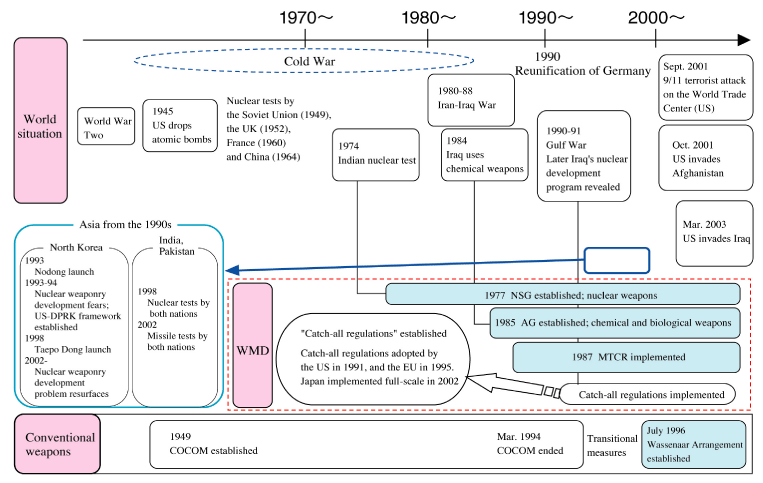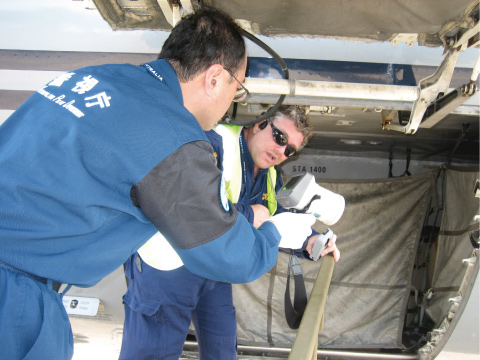1. International frameworks
After the end of World War II, an international framework to prevent the illegal export of WMD-related materials was constructed and implemented by international community. This framework was heavily influenced by the national security situation existing during the Cold War.
In the post-Cold War world, the need for enhanced transparency and strict management of conventional weapons, related general items and technology transfer remains high, and in July 1996, a new framework was formalized in Wassenaar, Holland. Called the Wassenaar Arrangement, it is designed to prevent "potentially destabilizing accumulations of conventional weapons," and has 28 signatory nations.
International frameworks have also been constructed to prevent the proliferation of WMD and delivery systems, such as missiles, since the Cold War era. The Nuclear Non-Proliferation Treaty (NPT) entered into force in March 1970, followed by the Biological Weapons Convention (BWC) in March 1975. In April 1987, the Missile Technology Control Regime (MTCR) entered info force to regulate the export of components and technologies related to missiles, including the missiles capable of being used as vehicles for WMD and related components and manufacturing equipment. In April 1997, the Chemical Weapons Convention (CWC) entered into force, prescribing the abolishment of all chemical weapons and related manufacturing facilities. Export regulations are enforced for general-purpose products related to WMD by the Nuclear Suppliers Group (NSG) and the Australia Group (AG).
2. Recent international situation
In February 2006, the Third Asian Senior-level Talks on Non-Proliferation (ASTOP-3) were held in Tokyo, with an exchange of opinions on strengthening the non-proliferation system in Asia. Participating governments agreed that the proliferation of WMD by North Korea poses a grave threat not only to Asia, but to the international community as a whole, and announced support for the six-party talks as a framework to find a peaceful resolution.
Within this situation, North Korea launched seven ballistic missiles in July 2006, six of which fell into the Sea of Japan. In the same month, the United Nations Security Council, based on a proposal by Japan, the United States and others, unanimously approved Resolution 1695 condemning the missile launches and demanding that North Korea suspend all ballistic missile related activities.
The seven ballistic missiles are thought to have included a Taepo Dong-2 missile, with range capable of reaching all points in Japan, posing the threat of the WMD proliferation to Japan more severe than ever.
President Bush of the US and President Putin of Russia announced a global initiative to prevent the acquisition of nuclear materials by terrorists, on the occasion of the St. Petersburg Summit in July 2006. In a joint communique after the bilateral, both leaders expressed deep concern about the North Korean missile launches, calling for a moratorium on launches and a return to the six-party talks.
In September 2006, Japan implemented measures to prevent the transfer of funds by fifteen organizations and one individual affiliated with the North Korea missile and WMD programs, in accordance with the resolution of the UN Security Council and as approved by the Japanese cabinet.
The action was taken against twelve organizations and one individual identified by the United States as being affiliated with North Korea, as well as against additional three organizations detected by Japanese police in the course of investigations into illegal export of WMD-related materials to North Korea in the past.
In October 2006, with consideration of the international situation including the announcement of an underground nuclear test by North Korea, Japan instituted a range of new measures against North Korea. The UN Security Council announced that it would implement measures as defined in Article 41 under Chapter 7 of the United Nations Charter, condemning the underground nuclear test announced by North Korea, and demanding that it suspend all ballistic missile launches and nuclear tests. The proposal was unanimously adopted as Resolution 1718.
|




